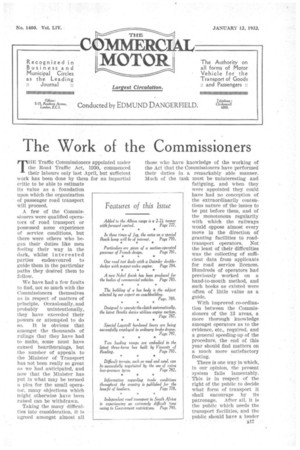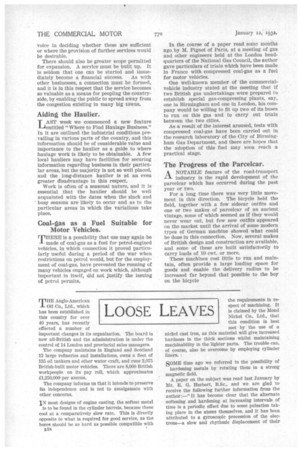The Work of the Commissioners
Page 35

Page 36

If you've noticed an error in this article please click here to report it so we can fix it.
THE Traffic Commissioners appointed under the Road Traffic Act, 1930, commenced their labours only last April, but sufficient work has been done by them for an impartial critic to be able to estimate its value as a foundation upon which the organization of passenger road transport will proceed.
A few of the Commissioners were qualified operators of road transport or possessed some experience of service conditions, but there were others who began their duties like men feeling their way in the dark, whilst interested parties endeavoured to guide them in the particular paths they desired them to follow.
We have had a few faults to find, not so much with the Commissioners themselves as in respect of matters of principle. Occasionally, and probably unintentionally, they have exceeded their powers or attempted to do so. It is obvious that amongst the thousands of rulings that they have had to make, some must have caused heartburnings, but the number of appeals to the Minister of Transport has not been really so great as we had anticipated, and now that the Minister has put in what may be termed a plea for the small operator, many. objections which might . otherwise have beeii raised, can be 'withdrawn.
Taking the many difficulties into consideration, It is agreed amongst almost, all those who have knowledge of the working of the Act that the Commissioners have performed their duties in a remarkably able manner. Much of the task must be uninteresting and fatiguing, and when they were appointed they could have had no conception of the extraordinarily contentious nature of the issues to be put before them, and of the monotonous regularity with which the railways would oppose almost every move In the direction of granting facilities to roadtransport operators. Not the least of their difficulties was the collecting of sufficient data from applicants for road service licences. Hundreds of operators had previously worked on a hand-to-mouth method, and such books as existed were often of little value as a guide.
With improved co-ordination between the Commissioners of the 13 areas, a more thorough knowledge amongst operators as to the evidence, etc., required, and a general speeding-up of the procedure, the end of this year should find matters on a much more satisfactory footing.
There is one way in which, in our opinion, the present system fails lamentably. This is in respect of the right of the public to decide what form of transport it shall encourage by its patronage. After all, it is the public which needs the transport facilities, and the public should have a louder voice in deciding whether these are sufficient or where the provision of further services would be desirable.
There should also be greater scope permitted for expansion. A service must be built up. It is seldom that one can be started and imme diately become a financial success. As with other businesses, a connection must be formed, and it is in this respect that the service becomes so valuable as a means for peopling the countryside, by enabling the public to spread away from the congestion existing in many big towns.
Aiding the Haulier.
T.AST week we commenced a new feature Aentitled "Where to Find Haulage Business." In it are outlined the industrial conditions prevailing in various parts of the country, and this information should be of considerable value and importance to the haulier as a guide to where haulage work is likely to be obtainable. A few local hauliers may have facilities for securing information regarding business in their particular areas, but the majority is not so well placed, and the long-distance haulier is at an even greater disadvantage in this respect.
Work is often of a seasonal nature, and it is essential that the haulier should be well acquainted with the dates when the slack and busy seasons are likely to occur and as to the particular areas in which the variations take place.
Coal-gas as a Fuel Suitable for Motor Vehicles.
T-HERE is a possibility that use may again -be made of coal-gas as a fuel for petrol-engined vehicles, in which connection it proved particularly useful during a period of the war when restrictions on petrol would, but for the employment of coal-gas, have prevented the running of many vehicles engaged on work which, although important in itself, did not justify the issuing of petrol permits. In the course of a paper read some months ago by M. Pignot of Paris, at a meeting of gas and other engineers held at the London headquarters of the National Gas Council, the author gave particulars of trials which have been made in France with compressed coal-gas as a fuel for motor vehicles.
One well-known member of the commercialvehicle industry stated at the meeting that if two British gas undertakings were prepared to establish special gas-compressing plants, say, one in Birmingham and one in London, his company would be willing to lit up two of its buses to run on this gas and to carry out trials between the two cities.
As a result of the interest aroused, tests with compressed coal-gas have been carried out in the research laboratory of the City of Birmingham Gas Department, and there are hopes that the adoption of this fuel may soon reach a practical stage.
The Progress of the Parcelcar.
ANOTABLE feature of the road-transport industry is the rapid development of the parcelear which has occurred during the past year or two.
For a long time there was very little movement in this direction. The bicycle held the field, together with a few sidecar outfits and one or two makes of parcelcar of an ancient vintage, some of which seemed as if they would never wear out, but few new outfits appeared on the market until the arrival of some modern types of German machine showed what could be done in this connection. Now, several makes of British design and construction are available. and some of these are built satisfactorily to carry loads of 10 cwt. or more.
These machines cost little to run and maintain, often provide a large loading space for goods and enable the delivery radius to be increased far beyond that possible to the boy on the bicycle




































































































